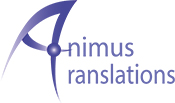Getting started as a translator: our tips and advice
Posted by Nyx Whyte - 28/10/2018

There are many ways to get started as a translator and you’ll need to think about the best approach for you. We’ll do our best here to answer some of the common questions aspiring translators ask and give you a few tips to get you started.
Firstly, do you need qualifications?
The answer to this is, technically, no. There are no required qualifications to be a translator, which is one thing which can make it difficult for clients to find a professional to work with. However, you will find having qualifications improves the quality of your translation and opens many doors for you. The most sought after qualifications are undergraduate or postgraduate degrees in languages or translation.
Not all agencies or clients require specific qualifications, but many require at least a language degree or a diploma for interpreting. Animus Translations require our translators to have at least a Masters’ degree in translation, so if you want to work with us specifically, then you’d need this type of qualification. You can find out more about working with us on our careers page.
In general, specific types of translation such as technical translation or conference interpreting are more likely to require qualifications than others. There are also other options such as diplomas and certifications from various translation organisations such as ITI or ATA. Membership to a relevant organisation in your country is highly recommended, both for recognition and finding work, but can be expensive and time consuming, so think of it as an investment.
How important is experience?
Simply put, experience is very important, and you should get as much of it as you can. It will improve the quality of your translation and help you to find more clients. Many agencies and clients prioritise experience over qualifications, and may require a certain number of years’ experience before working with you.
It will be easier to get experience after you complete a qualification, but you may still need to start out with unpaid experience, such as an internship. Some internships are paid, but these are often highly sought after. Other options include working with charitable organisations or offering your work at a lower rate to add to your CV. If you want to work in a specific field, such as medical or legal translation, you’ll also need to learn as much as you can about the relevant terminology. Many people come to translation later in life and make use of their prior experience in other fields, which can be invaluable for your later work.
How can you ensure success once you get started?
When you first get started as a freelance translator, it can be a bit overwhelming. You may also be tempted to accept as many jobs as you can to bulk out your CV. However, it’s important to make a few decisions beforehand and really think about what you want to achieve.
One of the first questions people ask is, how much should I charge? Well, the answer to that question is often more complicated than you might think and will depend on your goals. For example, do you want to do less translation, but charge more? Or do you want to get lots of experience quickly, and charge less? Do you have specific skills, such as medical knowledge, or work with sought after or unusual language combinations? To make this decision, do some research about the prices often charged by translators working in similar circumstances. Once you decide upon a minimum rate for your services, stick to it.
When it comes to pricing individual projects, think hard about how long a project will take you to complete. Don’t be afraid to charge more for technical work or working with difficult file formats, such as scanned files. Be prepared to lose out on work if the client thinks your rates are too high, and try not to get involved in a ‘race to the bottom’.
In terms of finding clients, it can help to use websites such as Proz or other translation-related websites. Make sure you have a good CV you can send to potential clients and set up social media such as LinkedIn, or your own website. You can also turn to those you know, contact your local chamber of commerce, or gain membership to your country’s translation association (in the UK, this is ITI).
Before accepting a job from a new client, do some basic research about the client. There are many translation agencies who pay late, pay poorly, or don’t pay at all. You can find lists of such agencies online, including www.translator-scammers.com, which also includes lists of email scammers who target and impersonate translators.
You also need to have a clear idea of your own limits and how long it takes you to translate, before you accept a project. Will you have enough time to do a good job? Do you have the technical expertise required for this particular job?
Keep track of how many words you can translate per hour or working day for certain types of project. As a rough guide, the average daily amount is 3,000 words per day for an experienced translator. At first you will translate slower than this, so factor this in. Technical projects, difficult file formats, or particularly creative work will take longer. Don’t be afraid to ask for more time before accepting the job – it’s better to ask for more time at the start than submit a project late. And if you don’t think you can handle a specific document, topic, or deadline, then don’t accept the job.
To help you understand the original file and the client’s needs, ask questions and check if the client has any reference material, previous translations, or specific requests for you. Ensure you have access to good quality dictionaries and save useful websites. If you get stuck, you could turn to forums or other online resources, or you can ask your colleagues for help. If you’re really struggling to understand part of the text, you can also ask the client to clarify what they wanted to say.
Using resources such as translation memory software can also save you a lot of time – particularly for repetitive texts or commonly used phrases. Trados is the industry standard, but it can be very expensive. Alternatives include Memsource, which has a free version, but is less comprehensive and less commonly used by agencies.
There’s a lot more to learn and you’ll gain experience and knowledge as you work, but we hope this advice will help get you started. Good luck!
